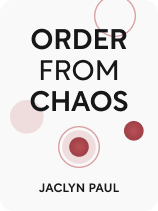

This article is an excerpt from the Shortform book guide to "Order From Chaos" by Jaclyn Paul. Shortform has the world's best summaries and analyses of books you should be reading.
Like this article? Sign up for a free trial here.
Do you struggle with ADHD symptoms? How can you cope with ADHD?
Every person with ADHD is different, and their ADHD affects them differently. There’s no cookie-cutter method for organization that will work perfectly for everyone, so you have to form an understanding of how your ADHD affects you personally in order to devise the best organizational system to manage it.
Here’s how to cope with ADHD, according to Order From Chaos by Jaclyn Paul.
Understand Your Purpose
An essential part of Paul’s recommendations on how to cope with ADHD is to identify the reason you want to get organized and keep that front of mind as you begin implementing her tips. Staying motivated is particularly difficult for people with ADHD, so you’ll need to have a purpose for organizing that you can come back to any time it starts to feel too difficult. This purpose should be unique to you and related to the values that are important to you. It also can’t stem from the belief that you should be able to do something. That comes from a place of judgment and external pressure, and your purpose needs to provide you with internal motivation. Your purpose should help you nurture your genuine self so you can live the life you want to live.
For example, you may want to get organized because you value time with your friends and family, and better organization would give you more time to enjoy their company. You may value the serenity of an uncluttered workspace, or the freedom to take time off from work when you need it without feeling like you’re falling behind.
| Using Happiness to Find Your Purpose Other experts also identify purpose as an important motivator in life. In The Success Principles, Jack Canfield explains that finding your life’s purpose helps you direct your actions toward a specific goal and achieve what you want. To identify your purpose, he recommends that you reflect on what makes you happy in life and what you like about yourself and distill these into a purpose statement you can refer back to whenever you need to remind yourself of your motivation. If you identify your purpose by reflecting on what makes you happy, you’re less likely to come up with a purpose that stems from a place of judgment. For example, if you know that being creative makes you happy, your purpose statement could be that you want to get more organized so you have more time for creative pursuits. |
Understand Your Limitations
Another part of getting to know yourself is understanding your capabilities and limitations. Organizing becomes much easier when you only have to organize a manageable number of items. This means you need to be able to say no to people and commitments, let go of things in your life that don’t serve your purpose, and only use as much physical space and belongings as you can reasonably manage.
Paul explains that ADHD brains have less dopamine—the neurotransmitter that drives the body’s reward system—available to them. This means ADHDers seek stimulation and novelty, which can lead them to take on more obligations and commitments than they can handle. While it may be frustrating to accept, sometimes you need to demand less of yourself so you can consistently meet expectations. You may simply have a lower threshold for what you can reasonably take on than someone without ADHD.
| Don’t Expect Yourself to Be Perfect Setting reasonable expectations can be especially hard for ADHDers because they often have perfectionistic tendencies. These may result from always feeling like you’re not doing enough or from a belief that you’ll perform better under unreasonably high expectations, but in any case, they tend to lead to procrastination and frustration. It can help to remember that you don’t have to do things the way everyone else does—if you find you can’t take on as many commitments as your peers can, don’t force yourself to. It can also help to reverse the adage “Anything worth doing is worth doing well” by understanding that “Anything worth doing is worth doing poorly.” Making some progress on a task or expectation—and getting the resulting dopamine boost—is better than not doing it at all just because you won’t accept anything less than perfection. |
Understand How You Learn
According to Paul, understanding your learning style will help you on your journey to better organization. Getting organized is a process of teaching yourself new habits, so it’s important to understand the best way to accommodate your learning needs. Paul describes three types of learning styles: auditory, visual, and tactile.
- Auditory learners learn best from hearing information. They may read out loud rather than silently, and they often benefit from discussing information with others in order to better comprehend it.
- Visual learners learn best by seeing. They benefit from pictures and graphics, and they’re good at visualizing, so they’re especially engaged by imagery in stories. Visual learners are particularly prone to the pitfall of “out of sight, out of mind,” which means that once something is no longer in their sight, they forget about it.
- Tactile learners learn best by doing. They benefit from activities like building and drawing, and they may be particularly expressive with their hands and bodies. They may struggle to sit still and focus for long periods without something physical to do.
Your learning style will affect what organizational system works best for you, explains Paul. If you’re a visual learner, you may respond well to a system that incorporates color and sequence (like file folders with the tabs arranged sequentially) to help you keep track of different things. If you’re an auditory learner, you may do your best organizing with a podcast or music playing in the background. If you’re a tactile learner, you’ll need to pause from your organizing now and then to move your body around. You likely have a combination of preferred learning styles, with one or two being dominant. You can use online quizzes to identify your learning styles and then tailor your organizational system to suit your learning style.
Understand Your Scheduling Needs
Finally, identify your ideal daily schedule based on your energy and focus levels, writes Paul. Do you function best if you go to bed early and get up early, or are you more productive if you stay up later and sleep in? What types of work are easiest for you to complete at various times in the day? You may want to reserve your physical organization tasks for the time of day when you have the most energy, and do the ones that require little thought for the time of day when you may have less mental energy.
(Shortform note: One way to determine when you’re most productive and when you need rest is to figure out your circadian rhythm. Different people have different circadian rhythms, meaning the hours of the day during which they sleep best and work best are different. In particular, people with ADHD often have circadian rhythms that cause them to sleep and wake up later, making them more productive in the afternoons or evenings than in the mornings.)

———End of Preview———
Like what you just read? Read the rest of the world's best book summary and analysis of Jaclyn Paul's "Order From Chaos" at Shortform.
Here's what you'll find in our full Order From Chaos summary:
- What ADHD is and how it affects cognitive functioning
- How those with ADHD can gain control over their lives and find peace
- How to implement an organization system that works with your needs






